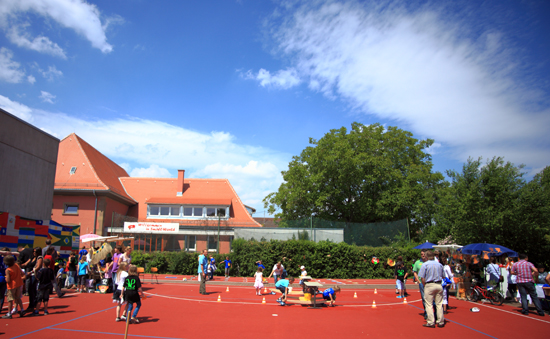Education: Education Structure
Introduction
There is an optional kindergarten provided for German children between the ages of 3 and 6 years, after which schooling becomes compulsory. This extends for nine years—from age 6 to15—although German education generally lasts until the age of 18. Homeschooling is illegal in Germany, and parents who refuse to send children to school face heavy fines of up to €50,000.
Girls and boys are educated together without the requirement for a formal school uniform. In recent years, the concept of school clothing, a collection of shirts and sweaters typically branded with the school logo, has been introduced. These are not compulsory and are worn to instill a sense of pride in the school rather than for formal reasons.
German is the formal language of instruction in state schools.
Formal Structure of the School System
Pre-school
Type of school providing this education: Kindergarten
Length of program: 3 years
Age: 3 to 6 years
Primary
Type of school providing this education: Grundschule
Length of program: 4 years
Age: 6 to 10 years
Lower Secondary
Type of school providing this education: Hauptschule
Length of program: 5 or 6 years
Age: 10 to 15 or 16 years
Certificate/diploma awarded: 5 years: Hauptschulabschluss; 6 years: Realschulabschluss
Lower Secondary
Type of school providing this education: Realschule
Length of program: 6 years
Age: 10 to 16 years
Certificate/diploma awarded: Realschulabschluss
Lower Secondary
Type of school providing this education: Gesamtschule
Length of program: 5 or 6 years
Age: 10 to 15 or 16 years
Certificate/diploma awarded: Hauptschulabschluss/Realschulabschluss
General Secondary
Type of school providing this education: Gymnasium
Length of program: 8 years
Age: 10 to 18 years
Certificate/diploma awarded: Allgemeine Hochschulreife/Fachgebundene Hochschulreife
Vocational Secondary
Type of school providing this education: Berufsschule (part-time)
Length of program: 3 years
Age: 15 to 18 years
Certificate/diploma awarded: Hauptschulabschluss, Mittlerer Schulabschluss, Vocational school-leaving certificate and professional certificate (Facharbeiterbrief / Kaufmannsgehilfenbrief / Gesellenbrief, depending on professional sector)
Vocational Secondary
Type of school providing this education: Fachoberschule (full-time)
Length of program: 2 years
Age: 16 to 18 years
Certificate/diploma awarded: Fachhochschulreife
Primary education (Grundschule) lasts for four years in most states, except Berlin and Brandenburg, where it lasts for six years.
After primary education, there are four options for secondary schooling: Hauptschule (the least academic), Realschule (more technical school, centrally ranked for academics), Gesamtschule (comprehensive school), and Gymnasium (college preparatory school, the most academic). The secondary school system results in different leaving certificates and qualifications. After attending any of the secondary schools and gaining a leaving certificate, graduates can start a career with an apprenticeship at a Berufsschule (vocational school). All types of vocational schools offer the opportunity to acquire general education certificates in a particular trade and are typically attended part-time in addition to work.
The more academic schools are the Realschule and Gymnasium, which prepare pupils for higher education. The final examinations taken are referred to as Abitur and lead to the Allgemeine Hochschulreife, the standard university entrance requirement. Entry requirements vary, with a pupil's performance at primary school being immaterial. In some German states, those wishing to apply for a Gymnasium or Realschule need a teacher's recommendation stating that the pupil is likely to make a successful transition to that type of school. In other cases, any student may apply. In Berlin, approximately one-third of Gymnasium places are distributed by lottery. Students not attending a Realschule or Gymnasium but wishing to proceed to higher education can enroll at a higher secondary school to study for the Allgemeine Hochschulreife.
School Timetable
The school year starts at the end of August and is divided into two terms. Exact holiday dates differ between states, but there are always six weeks of summer and two weeks of Christmas holidays, as well as other term breaks in the year.
The school week may be as short as 20 hours in the early grades, gradually increasing in length over the years. Figures below are typical of a Gymnasium school.
Term dates: (One) End of August to January, (Two) February to end of June
School days: Monday to Friday
School hours: 08:00 to 15:10
Grading System
Secondary schools in Germany generally grade on a six-point scale, where 1 is sehr gut (very good), 4 is ausreichend (adequate), and 6 is ungenügend (unsatisfactory).
In the six-point grading scale used at gymnasiale Oberstufe (high schools), marks equal points: 1 = 13-15 points, 2 = 10-12 points, 3 = 7-9 points, 4 =4-6 points, 5 = 1-3 points, and 6 = 0 points.
Higher education institutions in Germany generally grade on a five-point scale, where 1 is sehr gut (very good), 2 is gut (good), 3 is befriedigend (satisfactory), 4 is ausreichend (adequate), and 5 is nicht ausreichend (insufficient).
Cost of Schooling
State schools in Germany do not charge tuition fees. Textbooks and other school materials are either free or lent out. The majority of pupils attend state schools in their neighborhood, with only 6 percent of children nationally attending a private school.
Special Schools
Great efforts are made to integrate students with special educational needs into regular schooling. Children with particularly challenging teaching needs are educated in special schools called Förderschule or Sonderschule. Teachers at such schools are trained to respond to pupils with emotional or mental problems affecting their learning. Classes have very low teacher-pupil ratios. Less than 5 percent of pupils nationally are required to attend these schools.
Children identified as being at risk for low academic achievement may be visited at home by trained professionals. These specialists may simply provide information on childcare and social services, but also can help parents teach problem-solving skills to their children. They may help implement the school curriculum at home or provide a curriculum of educational games designed to improve language, development, and cognitive skills in young children. This support is offered to families on a voluntary basis.
The German school system does not routinely test student IQ. Specific educational programs for gifted students do not exist in Germany.
Church and state are separated in Germany, and therefore, state schools are not affiliated with any faith group. School prayers and religious services are not permitted and the wearing of religious icons is also forbidden. The German constitution does allow for any private group to set up schools, however, and a small number of private faith schools operate.
Curriculum
The Federal Ministry of Education and Research imposes a prescriptive curriculum at primary level. Pupils study German and mathematics every day, supplemented by two class periods per week in science, religion, physical education, and art or music. Some children begin foreign language instruction as early as third or fourth grade, and by their fifth year of schooling, virtually all pupils in Germany are learning a foreign language, even those planning to enter training for blue-collar trades.
The secondary curriculum builds on this foundation by providing a strong grounding in mathematics, modern languages, and technical fields. Students take German and math lessons for four periods each per week; a foreign language (usually English), geography, physical education, and fine arts for two periods each per week; and science and history for one period each per week. About one-third of secondary pupils study a third language, such as French or Russian. Vocational schooling has a similar curriculum in the early years, but later specializes in certain trades depending on the student's desired profession.
Bundesministerium für Bildung und Forschung (Federal Ministry of Education and Research)
Heinemannstr. 2
53175 Bonn
Tel: [49] 228 99 57 0
Web: www.bmbf.de
Copyright © 1993—2025 World Trade Press. All rights reserved.

 Germany
Germany 

